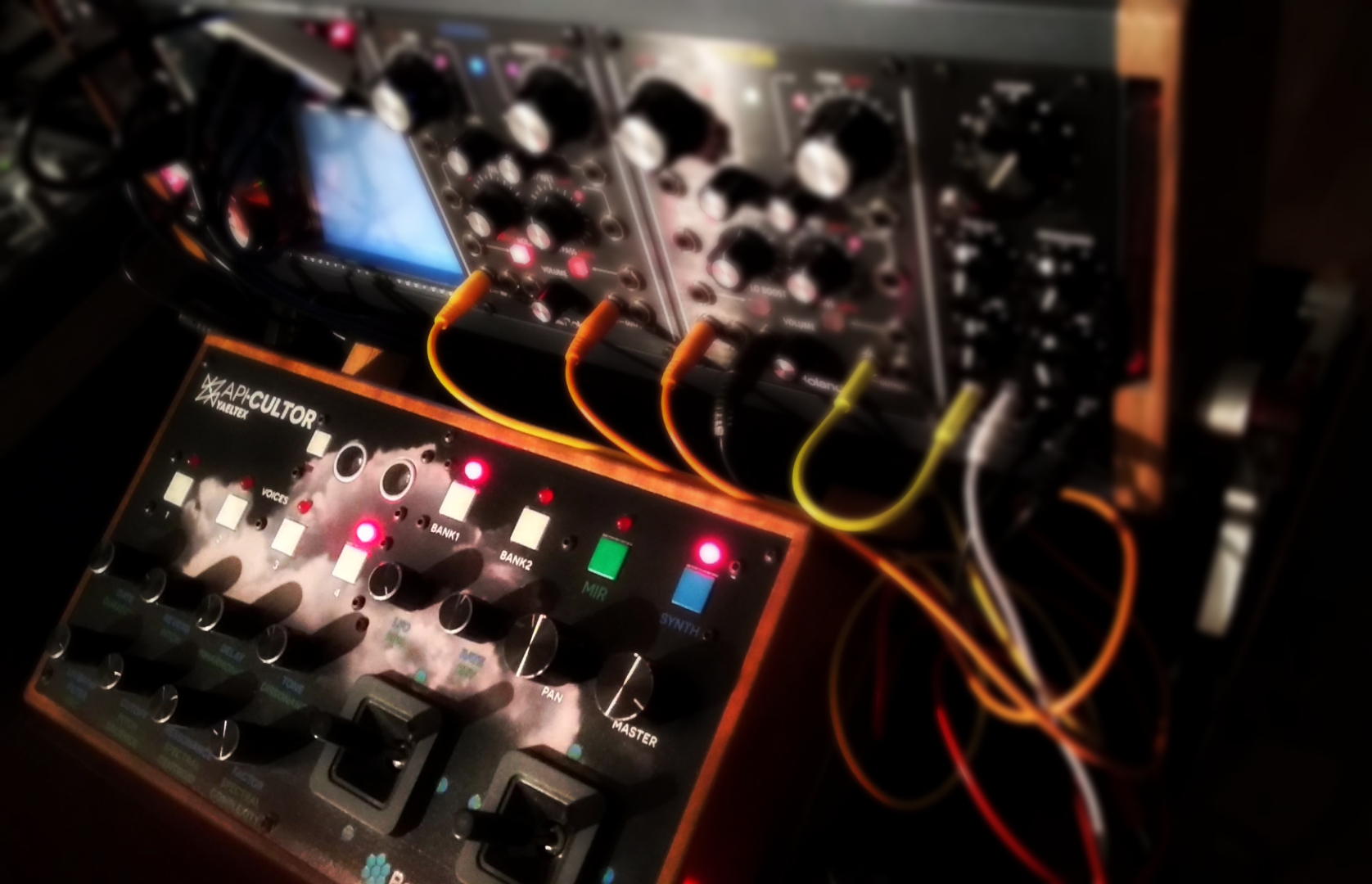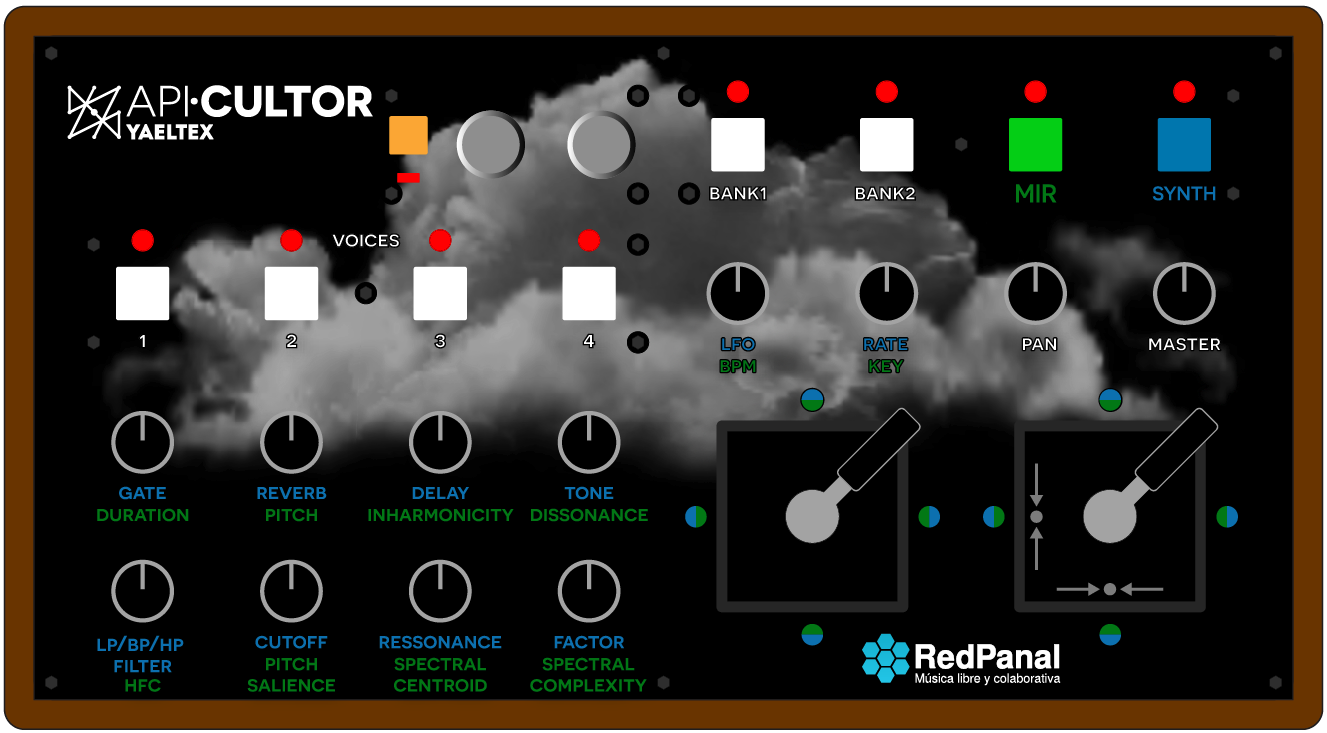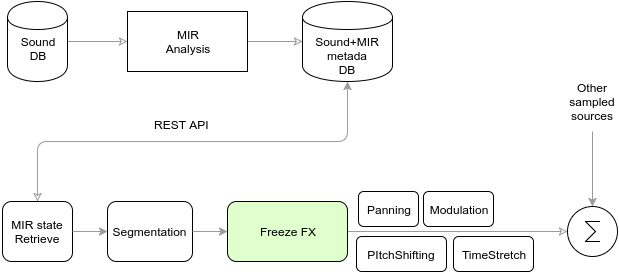Apicultor: Modular Music Information Retrieval Toolkit
Apicultor is a modular toolkit for Music Information Retrieval (MIR), sound analysis, and algorithmic composition. It features a flexible plugin architecture that allows you to enable only the components you need, making it suitable for everything from research environments to embedded systems.
✨ Key Features
- 🧩 Modular Plugin Architecture - Enable/disable components as needed
- 🎵 Music Information Retrieval - Extract audio features and descriptors
- 🤖 Machine Learning - Sound similarity, clustering, and classification
- 🎭 Emotion Analysis - Music emotion recognition and generation
- 🎛️ Real-time Performance - Live coding with OSC/MIDI control
- 🌐 Database Integration - Freesound, RedPanal, and local file support
- 🔧 Type Safe - Full type annotations for robust development
- 📊 Comprehensive Testing - Extensive test coverage
🚀 Quick Start
Installation
# Install from source
git clone https://github.com/sonidosmutantes/apicultor.git
cd apicultor
pip install -e .
# Or with Poetry
poetry install
Basic Usage
import apicultor
# Initialize with default plugins
plugin_manager = apicultor.initialize()
# Use database plugin to search for sounds
db_plugin = plugin_manager.get_plugin('database')
results = db_plugin.search_sounds("piano", limit=10)
# Use constraints plugin for optimization
constraints_plugin = plugin_manager.get_plugin('constraints')
constrained_values = constraints_plugin.apply_lower_bounds(data)
Configuration
Create apicultor_config.json:
{
"plugins": {
"enabled_modules": ["database", "constraints", "machine_learning"],
"disabled_modules": ["emotion", "state_machine"],
"plugin_configs": {
"database": {
"default_provider": "freesound",
"freesound_api_key": "${APICULTOR_FREESOUND_API_KEY}"
}
}
}
}
Or use environment variables:
export APICULTOR_ENABLED_MODULES="database,constraints,machine_learning"
export APICULTOR_FREESOUND_API_KEY="your_api_key"
🧩 Available Plugins
| Plugin | Description | Use Cases |
|---|---|---|
| database | Sound database access (Freesound, RedPanal, local files) | Sound retrieval, corpus building |
| analysis | MIR feature extraction and descriptors | Audio analysis, feature vectors |
| machine_learning | Clustering, similarity, classification | Sound organization, recommendation |
| emotion | Music emotion analysis and generation | Affective computing, mood-based selection |
| segmentation | Audio segmentation algorithms | Structure analysis, boundary detection |
| state_machine | Markov chain composition and performance | Algorithmic composition, live coding |
| constraints | Mathematical optimization utilities | Machine learning, signal processing |
| sonification | Data-to-audio conversion | Scientific sonification, synthesis |
| gradients | Optimization algorithms | Deep learning, parameter tuning |
📖 Documentation
- Plugin System Guide - Complete guide to the modular architecture
- Installation Guide - Detailed installation instructions
- Development Guidelines - Contributing and development setup
- API Documentation - Complete API reference
🎪 Interactive Demos
- Cloud Instrument - Raspberry Pi + custom controller retrieving sounds using MIR descriptors
- Experimental Session - Live demo with MIDI controller
- Embedded Instrument - Running on Bela or Raspberry Pi
🏆 Recognition
- ArCiTec Prize - Technology Applied to Arts (2018)
- NIPS 2017 Art Gallery - Machine Learning for Creativity and Design
- Audio Mostly 2017 - “Sound recycling from public databases” publication
- Technarte Los Angeles 2017 - Conference presentation
🎵 Use Cases
Research & Analysis
# Enable analysis and ML plugins
export APICULTOR_ENABLED_MODULES="analysis,machine_learning,constraints"
# Extract features and cluster sounds
ml_plugin = plugin_manager.get_plugin('machine_learning')
clusters = ml_plugin.cluster_sounds(feature_vectors, n_clusters=5)
Live Performance
# Enable real-time performance plugins
export APICULTOR_ENABLED_MODULES="database,state_machine,sonification"
# Create Markov chain composition
sm_plugin = plugin_manager.get_plugin('state_machine')
composition = sm_plugin.create_composition(sounds, transitions)
Embedded/IoT
# Minimal setup for embedded systems
export APICULTOR_ENABLED_MODULES="analysis,constraints"
# Lightweight audio analysis
analysis_plugin = plugin_manager.get_plugin('analysis')
features = analysis_plugin.extract_features(audio_data)
🎛️ Hardware Integration

Apicultor supports:
- Custom MIDI controllers (Yaeltex and others)
- OSC communication for networked performance
- Raspberry Pi deployment for embedded instruments
- Bela Platform for ultra-low latency audio
🌐 Database Support
- Freesound.org - Collaborative sound database
- RedPanal.org - Latin American sound platform
- Local Files - Your own sound collections
- Custom APIs - Extensible database interface
🔬 Research Applications
Apicultor has been used in academic research:
- Sound Recycling - Automated discovery and reuse of online audio
- Music Emotion Analysis - Deep learning for affective music computing
- Algorithmic Composition - MIR-driven generative music systems
- Interactive Performance - Real-time sound manipulation and synthesis
🎨 Creative Projects
Performances with Sonidos Mutantes
- APICultor + No Input + Granular synthesis - Live performance
- Feature Thinking - Generative music using MIR state machines
- Banda de Mutantes - Experimental sound workshops and performances
Compositions
- API-Cultor compositions - Sound recycling pieces
- Reciclado de samples - Creative Commons remixes
🛠️ Development
Prerequisites
- Python 3.8+
- Poetry (recommended) or pip
- Optional: SuperCollider, Pyo, Pure Data
Setup
git clone https://github.com/sonidosmutantes/apicultor.git
cd apicultor
poetry install --with dev
# Run tests
poetry run pytest
# Type checking
poetry run mypy src/
# Code formatting
poetry run black src/ tests/
Contributing
- Fork the repository
- Create a feature branch
- Add tests for new functionality
- Ensure all tests pass and code is typed
- Submit a pull request
See Development Guidelines for detailed information.
📦 Deployment Scenarios
Docker
docker build -t apicultor .
docker run -e APICULTOR_ENABLED_MODULES="database,analysis" apicultor
Raspberry Pi
# Optimized for embedded systems
export APICULTOR_ENABLED_MODULES="analysis,constraints,sonification"
python -m apicultor.cli.run_analysis --input audio.wav
📄 License
This project is licensed under the GNU General Public License v3.0 - see the LICENSE file for details.
👥 Authors
- Hernán Ordiales - Creator and maintainer
- Marcelo Tuller (MarsCrop) - MusicEmotionMachine branch
- Community Contributors - See contributors
🔗 Links
- Website: Sonidos Mutantes
- RedPanal: Sound platform
- Research: Publications and papers
🌟 Support
If you find Apicultor useful, please:
- ⭐ Star this repository
- 🐛 Report bugs and suggest features
- 📢 Share your projects using Apicultor
- 🤝 Contribute code, documentation, or examples
APICultor born to realize interdisciplinary performances based on sounds from web platforms. The system combines Music Information Retrieval (MIR) analysis, real-time processing, machine learning, and human control to create new forms of musical expression and sound art.
Spanish version: README_es.md
News
2025 - Major Refactor & Modernization
- Complete Architecture Overhaul: Implemented modular plugin system with dependency injection
- Type Safety: Added comprehensive type annotations throughout the codebase using Python 3.8+ features
- FFmpeg Integration: Replaced subprocess calls with modern
ffmpeg-pythonlibrary for robust audio conversion - Database Modernization: Updated RedPanalDB to use
requestslibrary with proper error handling and async support - Project Restructuring:
- Moved audio-related modules (constraints, segmentation) under unified
/audiodirectory - Removed legacy code from gradients, emotion, and machine_learning modules
- Streamlined plugin discovery and configuration management
- Moved audio-related modules (constraints, segmentation) under unified
- Configuration System: New JSON-based configuration with environment variable support
- Testing Infrastructure: Added pytest framework with comprehensive test coverage and CI/CD support
- Poetry Migration: Migrated from setuptools to Poetry for modern Python dependency management
2018
- Migration to Python3 and setup.py install thanks to MarsCrop!
- MusicEmotionMachine by MarsCrop (in development)
- Cloud Instrument ready to play with an external controller, running in a dedicated device like Raspberry Pi or Bela Platform
2017
- SuperCollider patch to play in realtime using sounds from public repositories (databases on the web). Realtime synthesis, wav retrieving using MIR descriptors, OSC & MIDI communication between process and controllers.
2016
- First demos (extracting MIR features, database build, MIR State Machine, etc)
Developers
License
Free Software shared with GPL v3, see LICENSE.
Cloud Instrument
Using a desktop computer, a Raspberry pi or bela platform.
See cloud_instrument/README.md
Interactive DEMO: Cloud Instrument. Interactive demo retrieving sounds from the Cloud using MIR descriptors and processing them in realtime (using raspicultor aka raspberry pi + apicultor).

UI
Open Stage Control User Interface

Custom MIDI Controller design
 Yaeltex custom MIDI controllers
Yaeltex custom MIDI controllers

With a SuperCollider synthesizer/effects processor running in a Raspberry pi, plus an external sound card for high fidelity.
Performances
Sonidos Mutantes
Interdisciplinary performances based on sounds of the web platform Redpanal.org
Proofs of concept:
- Compositions & recycled samples
- API-Cultor compositions
- Proyecto de reciclado de sonidos libres de la web en RedPanal.org (sonido + referencia al original).
- Generative music using MIR state machine a free/libre sounds from Freesound.org:
- “Feature Thinking” (with Creative Commons sounds from Freesound.org) by hordia.
- State Machine @ CASo (Centro de Arte Sonoro) https://www.youtube.com/watch?v=sG1YUc8PQV4
- Live performances using this tool:
- Jam con guitarras + fx chain y sintes analógicos: Perfo mutante en La Siesta del Fauno
- Closing performance of the Workshop of Experimental Sound: http://redpanal.org/a/banda-de-mutantes-cierre-taller/
- La Noche de los Museos La Casa del Bicentenario: Performance 29/10/2016 Con visuales 3D (Blender game engine) ) Reseña: enjambrebit-y-la-banda-de-mutantes/
- “Remixes que toman audios libres de RedPanal.org para categorizarlos según diferentes tipos de emociones. Luego se elige una y se sincronizan las pistas, cambiando las tonalidades. De ser posible se separan de fuentes dentro de las mismas” (by Mars Crop)
- Beats intro jazz
- [Bass & DJ] (http://redpanal.org/a/sm-bass-guitar-plays-with-dj/)
Components
- Mock web service with API REST to provide audio samples using MIR descriptors as parameters
- State machine, with each state defined by several MIR descriptors.
- Interaction with the free internet sound database http://redpanal.org
- API REST
- Webscrapping by tag
- Algorithms MIR to extract mean values or by frame of audio samples
- Segmentation algorithms using different criteria.
- Classify algorithms and clustering of samples of the sound database
- Server OSC
- Examples in Supercollider, pyo
- Examples with MIDI and OSC controller. Locale and remote.

Dependencies
Tested under Linux, Mac OS (>10.11) and Windows 10.
Debian, Ubuntu 15.04 and 16.04 (and .10). And Docker images. Raspian @ Raspberry Pi
See INSTALL.md


